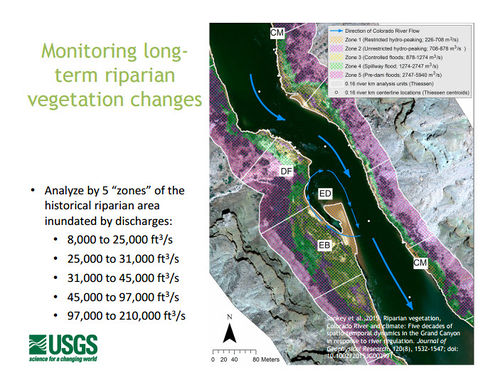|
|
Natural Processes
Restore, to the extent practicable, ecological patterns and processes within their range of natural variability, including the natural abundance, diversity, and genetic and ecological integrity of the plant and animal species native to those ecosystems. [1]
Nonfish Biotic Communities:
Native non-fish aquatic biota and their habitats are sustainably maintained with ecologically appropriate distributions.
• Populations of native non-fish species (invertebrates and vertebrates, including Northern Leopard Frog).
- AMP support, actions and funding are limited to incorporation of dam operations which are conducive to restoration of extirpated species.
• Minimize the abundance and distribution of non-native species in the CRE.
• Sustainable dam-influenced aquatic, wetland, and springs plant communities and associated biological processes, including those supporting threatened and endangered species and their habitats.
CRE Riparian Domain:
Native riparian systems, in various stages of maturity, are diverse, healthy, productive, self-sustaining, and ecologically appropriate.
• Native, self-sustaining riverine wetlands, and riparian vegetation and habitat, with appropriate mixture of age classes.
• Healthy, self-sustaining populations of native riparian fauna (both resident and migratory).
• Habitat for sensitive species within the CRE
• Encourage the resolution of the taxonomic status of the Kanab ambersnail (e.g., completely describe the taxa and subspecies).
• Habitat for neotropical migratory birds, waterfowl, and other appropriate native bird species.
• Ecological functions of tributary mouths and riverside springs, including habitat for native species.
|
